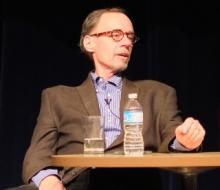Remembering David Carr, and His Writing on Monopoly Power
Stacy Mitchell, Co-Director of ILSR and Director of the Community-Scaled Economy Initiative, took a few moments to look back over the work of David Carr. Carr's work included investigating monopolies in the telecommunications space. Stacy's story, re-posted here, originally ran on ILSR.org.
What will we do without David Carr, the brilliant media columnist at the New York Times who died last week? At ILSR, we will especially miss his writing on monopoly power, Amazon, and the book business. Below we’ve excerpted and linked to a few of his best recent pieces on those subjects.
In Modern Media Realm, Big Mergers Are a Bulwark Against Rivals — July 16, 2014
Comcast’s bold strategy of acquisition kicked off a wave of defensive consolidation, fueled by a combination of fear and abundant capital in the media realm.
I talked to the head of one company that creates television and movies, who expressed a common sentiment. “When Comcast decided to get bigger,” he said, “we all had to ask ourselves, Are we big enough? We all have to think about getting bigger.”
And why not? No one is stopping them.
With big data, a Big Brother government and now big media, size creates its own prerogatives. When Amazon used its market dominance to limit access to Hachette books over a price dispute, regulators yawned. When AT&T and DirecTV propose a tie-up in response to Comcast, the market issues are just another deal point. Cable companies slowed down content from clients (which are also competitors) like Netflix, and it was treated as a business dispute.
For the most part, the current government has passed on regulating potential monopolies, and as citizens, we have become inured to the consequences of bigness.




